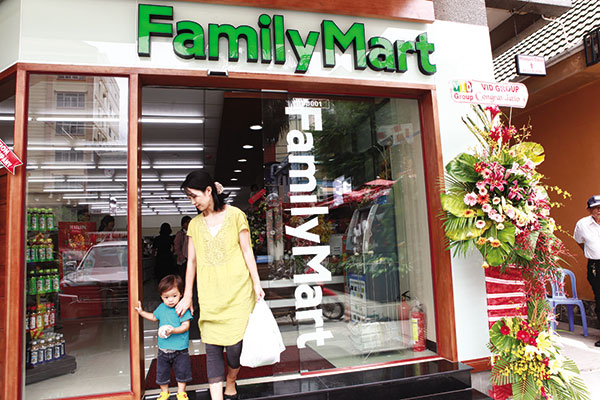Retail modernisation and e-commerce aiding FMCG
 |
| Foreign investors like FamilyMart and Digiworld are investing heavily in FMCG Photo: Le Toan |
Hirohisa Yamanouchi, general manager of the Merchandise and Marketing Department at FamilyMart Vietnam, told VIR that FamilyMart’s average sales per store in Vietnam have been growing at stable, double-digit figures in recent years.
“As more Japanese convenience stores spring up in Vietnam, modern retail has changed Vietnamese consumers’ shopping habits,” he said.
Almost 70 per cent of FamilyMart’s products are sourced locally, 10 per cent are made in Japan, and 20 per cent come from other countries.
The firm’s strategy is to choose fast-moving consumer goods (FMCG), which are convenient and easy to use, according to Yamanouchi. “We see that Japanese confectioneries are more popular in Vietnam than Japan. Meanwhile, prepared food has more room to grow in the country due to the lower number of products compared with those in Japanese chains.”
In the future, FamilyMart plans to introduce new snacks, candies, beverages, ice creams, and children’s books from Japan in Vietnamese chains, as part of the Japan Fair from November 2017 to January 2018.
According to the Japan External Trade Organization in Ho Chi Minh City, 76 products from 26 companies in Japan will be available at 153 FamilyMart convenience stores, 99 Ministop convenience stores, and four AEON malls during the fair. The fair aims to promote more Japanese products in the growing trend of FMCGs in Vietnam.
This is the second Japan Fair in Vietnam. The first fair introduced around 78 Japanese products in 200 FamilyMart and Ministop convenience stores, 40 per cent of which are still sold locally.
In addition to Japanese investors, other foreign investors also see bright prospects for this segment. In October, Vietnam-based Digiworld JSC, through its subsidiary Digiworld Venture, announced the completion of its purchase of 50.3 per cent of CL Co., Ltd. as a move to secure a foothold in the FMCG segment.
CL is a partner of Lion Corporation, a top Japanese firm in the toiletry and household product business. In 2001, CL started distributing Lion’s high-end FMCG products, including the Essence series; Kodomo, Fresh and White, and Zact toothpaste; Bio-Zip, Look, and Top powder detergent; and Systema toothbrushes.
Using CL’s distribution network across 63 cities and provinces, Digiworld expects to save time in penetrating the FMCG market, which has great growth potential.
Moreover, the FMCG sector is expected to gain further traction in the wake of e-commerce. Fabrice Carrasco, managing director of Kantar Worldpanel Vietnam, predicted that e-commerce in Vietnam will grow more than fivefold by 2020 on the back of widespread smartphone usage and increased demand for consumer convenience.
“The value share of e-commerce within FMCG is only about 0.2 per cent in Vietnam, while this figure reaches up to 3.9 per cent globally. The opportunity is there for someone to jump in and take the lead,” he said.
Traditionally known as an electronics retailer, Mobile World Group has branched out into the mini-mart sector under the name Bach Hoa Xanh, with hopes to open 80 stores by the year’s end. The firm also plans to expand its e-commerce business by opening an online store at Vuivui.com in 2020.
Vietnamese leading property developer Vingroup is also expanding its retail reach. The number of VinMart+ chains reached 1,000 outlets as of September this year, and the firm plans to increase this number to 3,000 within the next two years. Vingroup’s e-commerce arm Adayroi.com is also leading the pack of online shopping sites, with a 24 per cent market share, followed by Lazada and Tiki in second and third, respectively.
A Nielsen report named “What’s Next in E-Commerce” highlights the latest trends in consumer purchasing online within the FMCG sector, and points to strengthening growth in online adoption and spending around the world. The report illustrates that while FMCG has historically lagged behind categories like electronics, mobile goods, and travel when it comes to online spending, that trend is set to change in the coming years.
As retailers and manufacturers continue to solve many of the existing barriers to e-commerce adoption – such as retail infrastructure and supply, credit card fraud, and logistics (especially in supporting ‘last mile’ transportation) – the FMCG sector is set for exponential growth. These factors for growth are further compounded by surging consumer demand for products anywhere and at any time.
What the stars mean:
★ Poor ★ ★ Promising ★★★ Good ★★★★ Very good ★★★★★ Exceptional
Latest News
More News
- The generics industry: unlocking new growth drivers (February 04, 2026 | 17:39)
- Vietnam ready to increase purchases of US goods (February 04, 2026 | 15:55)
- Steel industry faces challenges in 2026 (February 03, 2026 | 17:20)
- State corporations poised to drive 2026 growth (February 03, 2026 | 13:58)
- Why high-tech talent will define Vietnam’s growth (February 02, 2026 | 10:47)
- FMCG resilience amid varying storms (February 02, 2026 | 10:00)
- Customs reforms strengthen business confidence, support trade growth (February 01, 2026 | 08:20)
- Vietnam and US to launch sixth trade negotiation round (January 30, 2026 | 15:19)
- Digital publishing emerges as key growth driver in Vietnam (January 30, 2026 | 10:59)
- EVN signs key contract for Tri An hydropower expansion (January 30, 2026 | 10:57)
















 Mobile Version
Mobile Version